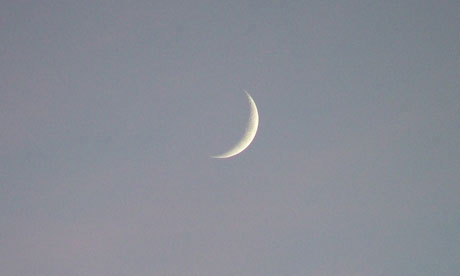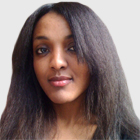Pinpointing the end of Ramadan and start of Eid al-Fitr isn't a precise art, which only makes those final hours of fasting worse

The wait for Eid al-Fitr to be announced at the end of Ramadan never gets less agonising. As Usama Hasan explained on this site back in 2008, because Ramadan and the month that follows are lunar months, their arrival can only be determined by the first sighting of the sliver-thin new crescent moon.
This year has been particularly painful. The first few days of Ramadan were the longest days I have ever fasted due to the fact that the month is creeping further into the long summer days of the northern hemisphere. But like other feats of endurance, the last few steps are the hardest. Everybody has a different experience of the month but for me, it is not so much the hunger/thirst/insert substance withdrawal here that starts to grate. It is the feeling of incarceration. Confined in a cage of abstinence, especially in a non-Muslim country, I feel detached from the rest of the world. While one can savour this isolation as an opportunity to commune with God or reconnect spiritually in general, towards the end of the month the tension and anticipation reach breaking point. Release is imminent, and hence every passing hour is more arduous, because you don't know when it will come.
There was a wicked rumour yesterday circulating that Eid in the UK may fall today, but this was quickly dispelled by Saudi Arabia, which announced that Eid would fall on Friday, with the sighting of the moon tonight. Minorities in Europe usually follow the Saudi's lead and the UK apparently decided to follow suit. But I only know this from a few texts received yesterday saying that we are to fast one more day. The London Central Mosque's website is frustratingly non-committal; announcing the timetable for Eid prayers, but not the day. But the European Council for Fatwa and Research has declared that Eid is today and thus most of continental Europe is already celebrating. The confusion is exacerbated by the flurry of premature Eid Mubarak ("Happy Eid") texts and emails – and, particularly annoying, Facebook statuses – which usually start a couple of days before Ramadan actually ends. So I find myself not reciprocating with grace, but demanding an official confirmation that it is indeed Eid, and not merely people jumping the gun. This is rather unkind, as I do not usually demand that people only say "Happy New Year" or "Merry Christmas" on the actual day of the calendar when the felicitation applies. But usually I have not just fasted the better part of a month at the time.
The confusion and globally staggered breaking of fasts is because "the orbit of the moon around the earth is such that it can take up to three days for the whole world to actually see the crescent for the first time each month, even after clouds have cleared" (Usama Hasan again). All very charming and antiquated. But when can I eat? The irony of it all struck me while immersed in web 2.0, emailing, and trawling Facebook and Twitter for Eid verification. Surely, in this day and age, there must be a more technologically advanced way of determining whether the moon is in waxing or waning crescent other than waiting for religious representatives to spot it with the naked eye. Indeed, surely there is a way of predicting when it will occur? So that there would be one clear day, and that I can speed past the finish line in a flush of pride and joy in my achievement. But alas, still fasting as I type this, I am limping towards it, warily, in fear that it might move a little bit further ahead once more.
(source:guardian.co.uk)


No comments:
Post a Comment